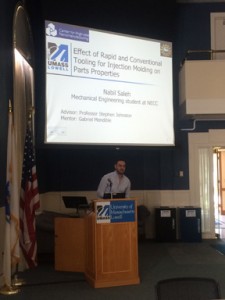NECC Students Spend Summer at UMass Lowell Research Program

Nabil Saleh of Methuen a mechanical engineering student at NECC makes his final presentation during UMass Lowell’s REU summer program.
Two Northern Essex Community College students, Nabil Saleh of Methuen and Kelsey Wright of Lawrence spent the summer playing with molds created from 3D printers.
They also navigated their way around new library search engines and developed their “elevator pitch”.
Saleh an NECC mechanical engineering student and Wright, who graduated in May from NECC with an Associate in Arts Liberal Arts: Biology Option degree, were two of 14 students who participated in UMass Lowell’s 10-week Research Experiences for Undergraduates (REU) program.
Saleh’s research involved the “Effect of Rapid and Conventional Tooling for Injection Molding on Parts Properties.” His advisor was UMass Lowell Associate Professor Stephen Johnston from the Department of Plastics Engineering. He was mentored by UMass Lowell doctoral student Gabriel Mendible.
He evaluated rapid tooling molds produced by a 3D printing process called Objet. For this work, he learned to operate the injection molding machines at UMass Lowell, optimized the injection molding conditions for the two types of molds, and molded test specimens with these optimized molding conditions. Saleh then tested the tensile, impact, and other properties of the molded parts to see how they changed when using a mold made from a plastics material. His work was part of a larger project in which Dr. Johnston’s research group has been investigating the effects of novel mold fabrication technologies and materials on the properties of the molded parts.
“It was a very good experience,” Saleh said. “I learned a lot and I gained experience that will help me in achieve my career goals. It was a new and challenging topic for me, but I enjoyed it a lot.”
Wright’s investigated a new method for modeling and meshing parts and creating the files used in 3D printing processes. Her advisor was Associate Professor David Willis from the Department of Mechanical Engineering. She was mentored by UMass Lowell graduate student Milo DiPaola. She made the jump from her associate degree in biology to working with solid model and meshing software. This model/meshing method has the potential to significantly increase the speed at which 3D printers can produce parts.
A portion of the program included helping the students improve their science communication skills. They learned to use search engines at UMass Lowell’s library and their transformed literature searches into introductions for their research projects.
They also participated in a modified Science Communication Workshop at the Boston Museum of Science in which they learned to discuss their research in short “elevator speeches” and to produce research presentations that could be understood by audiences from a wide range of technical disciplines.
The student received a small stipend for their participation.







